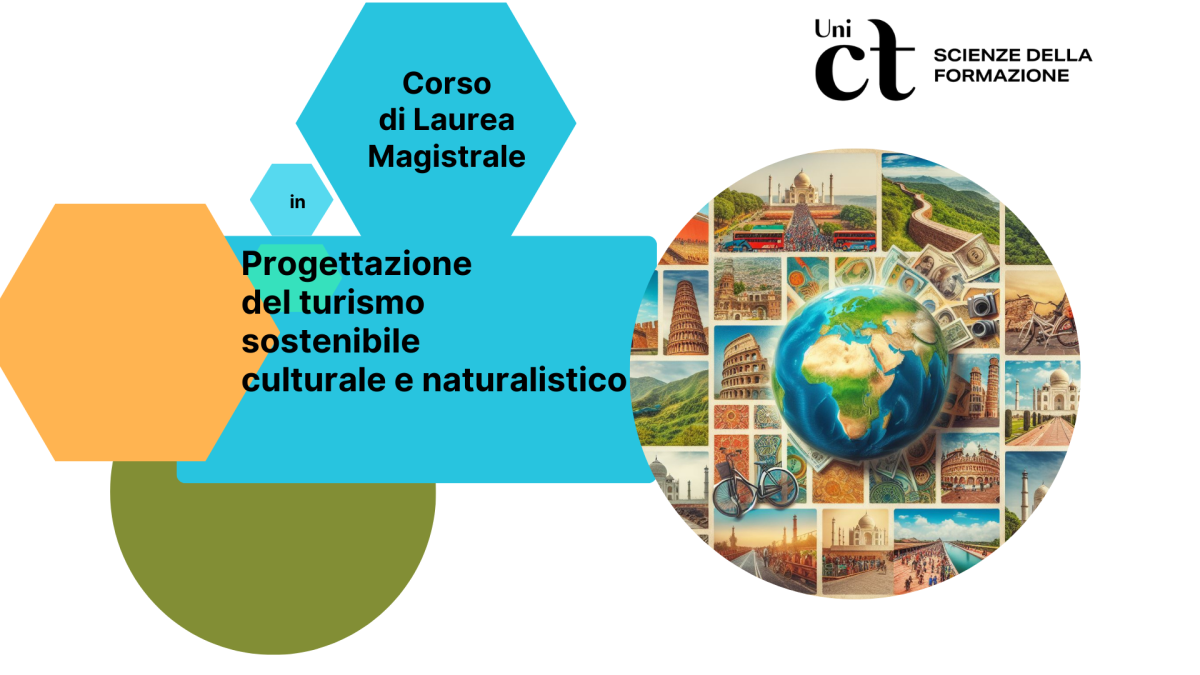Course Overview
The master’s degree Course (CdLM) in “Design of Sustainable Cultural and Nature-based Tourism” of the Department of Education Sciences belongs to the LM-49 class (Design and Management of Tourism Systems), unique at the University of Catania, and guarantees the completion of the educational pathway of the already active degree in Tourism Sciences (L-15). It provides students the opportunity to implement skills through a more specialized training, consistent with the current European planning based on the principles of sustainability. It proposes the achievement of the qualifying educational objectives of the LM-49 class set out in the tables annexed to Ministerial Decree No. 1648 of 19/12/2023 (“Determination of University Degree Classes”), integrated and declined according to specificities dictated by the updated analysis of job market demands.
The project is the result of synergic work between the proposing Department and the Department of Biological, Geological and Environmental Sciences, and is built taking into account the exigencies of the job market and the guidelines provided by the stakeholder and is aimed to fill a gap of competences today detected in the tourism system. The course is designed in the base of the called “new tourism”, representative of a new demand focused on the specificities of the territories, respect for the environment and local socio-cultural phenomena, for which the traditional training of operators is no longer skilled.
The Master Course aims to train tourism professionals able to combine skills in management and marketing with a high cultural profile derived from the learning of the disciplines of the territory in the double domain socio-cultural and geo-naturalistic; Graduates will be able to define the specificities of the contexts in relation with a sustainable and inclusive tourist valorization. Particular attention is paid to skills in the construction of innovative tourism products (echo-museums, mining parks, greenways, taste routes) and in the use of modern methodologies and techniques (ICT) aimed at communication, Management and organization of widespread cultural and nature activities.
Graduates will have the opportunity to find employment, including coordination and management functions, in tourist accommodation companies, as destination managers, and in the incoming; they can be employed in the design and marketing of niche travel experiences, organize and manage events both in cultural and natural environment and develop promotion and communication protocols; They will be able to work in government, central and decentralized institutions, in the fields of tourism, culture, cultural and environmental assets and local sustainable development; acting as consultants for local authorities and the hospitality industry to promote the territory’s cultural heritage, artistic, environmental, literary, food and wine and nature. To the above-mentioned professions must be added those that require a direct contact with the territory and specific knowledge of it as: mountain guide, volcanological guide, Middle Mountain guide, naturalistic guide, hiking guide, Guide to nature parks.
The Course is open-ended; it is organized into 2 years and 4 semesters; it provides for the achievement of 120 ECTS, of which 16 are reserved for the final test, 15 ECTS for activities freely chosen by the student, 12 ECTS to the internship activities at companies and institutions of the sector and 3 ECTS to further training activities that include language and computer certifications and activities aimed at further approaching the world of work.
Forty-eight ECTS are reserved for the characterizing modules as described in the class LM-49, in addition to languages, to historical-cultural, economic-managerial, environmental and social aspects. In addition, 12 to 24 ECTS are dedicated to related activities, conceived as an integral part of the offer that sees in the multidisciplinary a value added, consistent with the variety of outlets that the tourism system offers. These are lessons that point to the specialization of knowledge of the territory in its physical meaning, in line with the new alignment tourism/ territorial resources, fruit of the awareness of the “active” value of the social and cultural sector in the development of the economy.
Most of the disciplines comprise a minimum of 3 ECTS dedicated to laboratory activities and "on the field" aimed at integrating theoretical knowledge with practical activities of valorization and communication.
Students of the master course can access a well-established international traineeship programme (Erasmus + Traineeship) and are free to choose language to be used to write their final exam and to select a foreign research institution/center for the development of their project.
